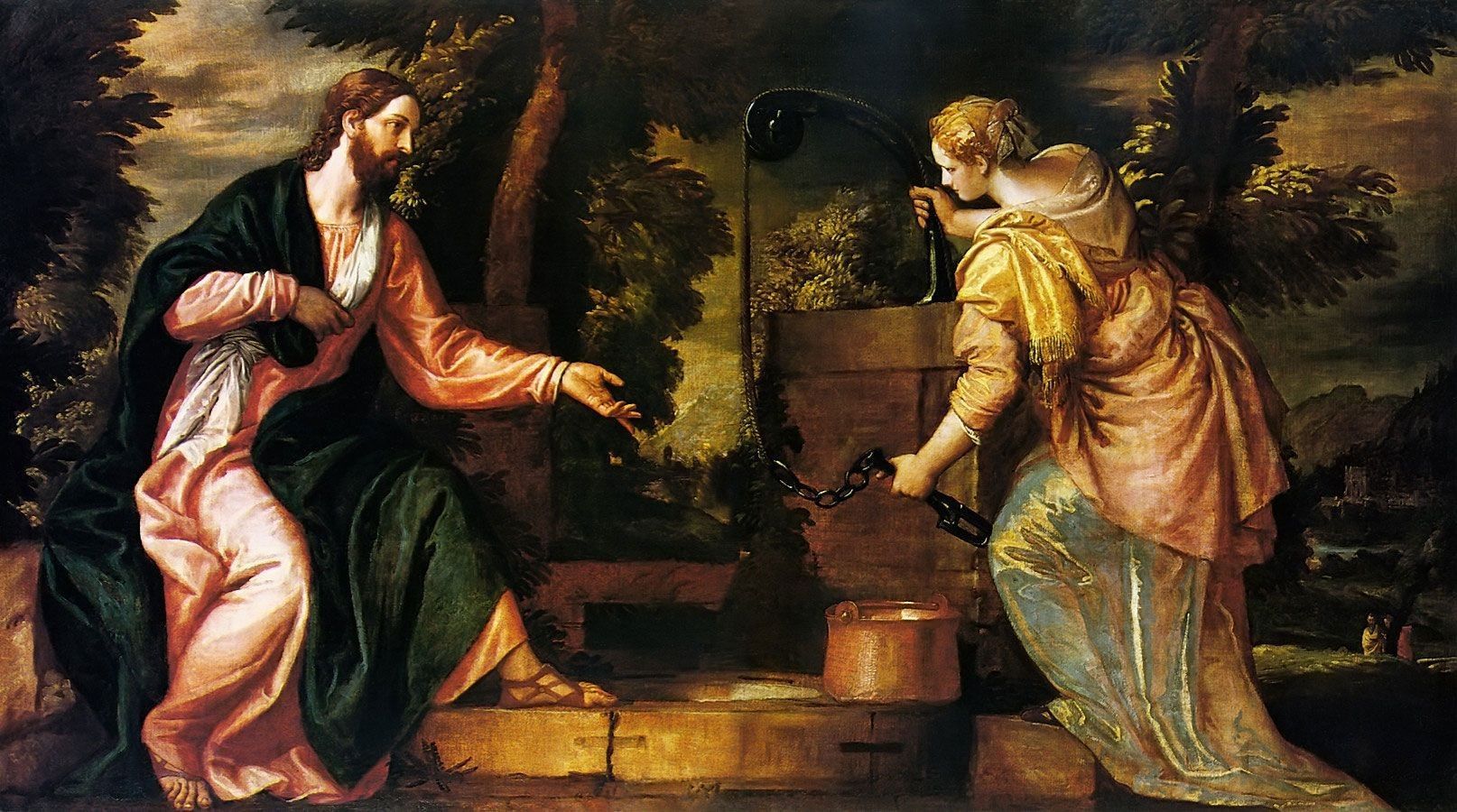
Woman at the Well
Devotions for John 4:1-42
Monday–Woman at the Well
“Now when Jesus learned that the Pharisees had heard ‘Jesus is making and baptizing more disciples than John” … he left Judea and started back to Galilee (John 4:1-3).
The community symphony was playing a piece by Mozart. It was a cascade of sound flowing over the ears of the audience. The music was soothing, while at the same time it stirred up long, quiet emotions. Unfortunately, the woodwind section came in a beat too early and soon the cascade was turned into a cacophony of sound. The audience quickly discovered that proper timing was essential to the successful completion of a musical composition.
Though the crowds had flocked to hear John the Baptist, he had made enemies of King Herod and poised a threat to the temple. He had been imprisoned and eventually executed. The political and religious authorities had begun to take notice of the rising popularity of Jesus. He too might have become a threat. It was not time, though, for Jesus’ final confrontation with the worldly powers to take place. Jesus had decided to withdraw to Galilee and continue his ministry away from the prying eyes and ears of his adversaries.
Like the community symphony orchestra and the ministry of Jesus, timing is important in our lives. We may not like the timing, though. The beat may be too fast or too slow. We may feel that the rests are too long and be tempted to rush and to come in a beat or two too soon. At such times, it is important for us to remember that the conductor is in control. If the symphony is to continue, we must allow the Lord to direct and follow God’s direction.
Lord, we confess that your time is not our time. Enable us to patiently wait for your perfect timing. Amen.
Tuesday–Woman at the Well
“The Samaritan woman said to him, ‘How is it that you, a Jew, ask a drink of me, a woman of Samaria’” (John 4:9).
From childhood, we are taught not to talk to strangers. We grew up and observed social mores of our society. We generally talked and interacted with people who were similar to us and shied away from people who looked, spoke or acted differently. Jesus was faced with the same instructions and was constrained by the same social rules. He decided to go against those cultural expectations, for the sake of the gospel, and invites us to do the same.
He might not have been the Samaritan woman, but he was a co-worker who looked like he was having a bad day. Rather than ignore him and tell herself that, “It’s not my problem,” Karen decided to talk with him. Surprised at first by Karen’s interest in him, the man decided to share his struggle with Karen. Not only was she able to share the man’s burden, but Karen was also able to offer a helpful suggestion and hopeful encouragement. No great theological discussion took place, but God’s love and grace was shared.
As followers of Jesus, we are surrounded by people to whom we have been told not to talk with, but who still need to hear grace filled words of respect, appreciation, and encouragement.
Use our words, Lord, to share your love and grace with others. Empower us to break through the social norms that constrain us and hinder your good news. Amen.
Wednesday–Woman at the Well
“But those who drink of the water that I give them will never be thirsty again” (John 4:14).
After a workout on a hot day, nothing quenches thirst like a cold, pure glass of water. Soda doesn’t do the trick and neither does sweet tea or milk. Water is what we need and it is only water that satisfies that need.
We may try to quench our existential and spiritual thirst in many ways. Still, it is only the steadfast love, overwhelming grace, and unconditional forgiveness that God offers to all of God’s children that refreshes us.
We can never get enough of the water that the Lord offers us. It is good that the well never runs dry and God invites us to freely drink from it.
“Fill our cups, Lord, we lift them up Lord. Come and quench the thirsting of our souls.” Amen.
Thursday–Woman at the Well
“Jesus said to her, ‘Go call your husband and come back” (John 4:16).
Suddenly the subject was out in the open. The Samaritan woman had been carrying around the shame and guilt of her failed relationships for years. The men whom she had trusted and depended on had betrayed her. She had been ridiculed and rejected by the people of her town. For too long a time, she had carried that guilt that something must be wrong with her. She was not as good as the other women. Jesus, though, was different. He didn’t judge her, nor did he look down upon her. Jesus uncovered the truth of her life and accepted her.
Confession, repentance and forgiveness are important elements in our relationship with God. We do not need to carry the guilt of our imperfect behavior, our unloving words and actions and our rebellion against God’s lordship in our lives. We can confess, seek to change our behavior through the power of the Holy Spirit and receive God’s forgiveness. In doing so, we can open ourselves up to the new and abundant life that is ours through the life, death and resurrection of Jesus.
Lord, forgive us for we have sinned. Amen.
Friday–Woman at the Well
“‘But the hour is coming, and is now here, when the true worshippers will worship the Father in spirit and truth’” (John 4:24).
“I love a traditional worship service, with chanting, responsive readings and the majesty of the pipe organ,” commented Greg. “Yuck!” Exclaimed Manuel. “That’s so old. The only way to really worship God now is with a praise band, loud music, hand clapping and singing.” Nearby, Lamar and Connie were discussing congregational size. “I like small congregations,” said Lamar. “I like the relationships that can be built.” Connie disagreed. “There’s so much more that a mega church has to offer,” she observed. The conversations continued highlighting differences and missing the essential truth.
The conversations of Greg and Manuel, and Lamar and Connie, were continuations of the conversations that took place between the Jews and the Samaritans. For centuries, they argued about where it was most appropriate to worship God. The Jews argued that God could only be worshipped at their temple on Mt. Zion. The Samaritans held out for the temple in their land. The woman wanted to continue this argument, but Jesus would have nothing to do with it. Jesus placed the emphasis on worshipping in spirit and in truth.
It is not where we worship or how we worship that matters. The important point is who we worship. When we worship the Lord, and we are able to enter into God’s presence and worship God in spirit and in truth because of Jesus’ life, death and resurrection. We can rejoice at the new relationship with God that we all have and the abundant life that is available to all of us. We can celebrate our new purpose in life because the temples have been destroyed and Jesus has been raised from the dead.
Lord, forgive us for our bickering. Rather, receive our thanksgiving and praise for the gift of worshipping you in spirit and in truth. Amen.
Saturday–Woman at the Well
“‘My food is to do the will of him who sent me” (John 4:34).
Camille was unaware of the passage of time. She was in “the zone”—a place where time is inconsequential. Camille did not feel hunger, thirst or the need for relief as she typed away on her book. The ability to express thoughts, form coherent sentences and complete paragraphs was food and drink enough. Camille was doing what she loved and what she felt called to do. Nothing else could be more satisfying and fulfilling.
As followers of Jesus, we have a new purpose in life. No longer is our highest calling to “make ends meet,” or to climb to the top of the ladder. Having died with Jesus at our baptism and risen to new life with him, our purpose is now to serve God. We do that by sharing God’s love and grace through our words and actions. Now our calling is to meet the needs of the poor and hungry, stand beside the oppressed and forgotten and oppose the injustices of our society. Nothing can be more fulfilling than being used by the Holy Spirit to touch the lives of others in a positive manner.
Thank you, Lord, for using us to share your love and grace and spread the good news. Amen.
Sunday–Woman at the Well
“Many Samaritans from that city believed in him because of the woman’s testimony, ‘He told me everything I have ever done’” (John 4:39).
Jaylene stood nervously before the group. “Let me begin by saying that I believe in God,” she said. I was prescribed an opioid after my back surgery. The pain did not go away and I continued to take the painkillers until I was addicted. My family sat down with me and confronted me with how my addiction was affecting my life and my relationships with them.
I sought treatment and during that time I encountered God. One night I sat down and had a long conversation with God. I confessed everything to him. It was as if God were sitting right beside me. While I talked, God put his arms around me and embraced me. When I told him the deepest secrets of my life, God didn’t turn away from me, but rather loved me and accepted me. I don’t have all of the answers, but I do know that God is real to me and I walk with God every day of my life.”
Like the woman at the well and Jaylene, our personal stories are powerful witnesses to God’s power and presence in the world. We may not be trained theologians, or have memorized hundreds of Bible verses. Our stories, though, are authentic and true. They tell about how God has changed our lives and they invite others to allow God to change their lives.
Many people believed because of the Samaritan’s woman’s testimony. Millions have believe because of the stories of countless Christians throughout the centuries. When others hear our stories, they too will believe. It is the work of the Holy Spirit.
Lord, use our stories to bear witness to your love and to touch the lives of the people around us. Amen.


It was very interesting and useful. Thank you very much
thank you